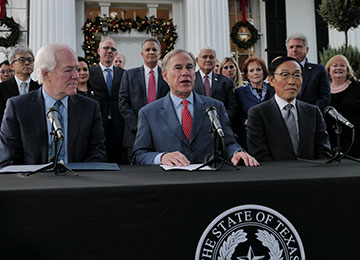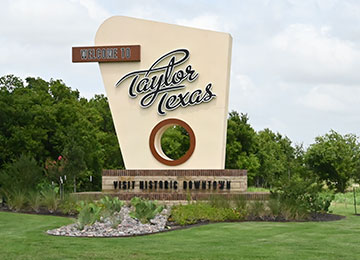Welcome to Texas No Pandemic Pause for Companies Moving to and Expanding in the Lone Star State
During a pandemic that brought the global economy to a crawl, Texas not only held on to but burnished its reputation as a top spot for business relocations and expansions. State leaders, experts and executives cite factors that long have made Texas an attractive choice: its business-friendly tax and regulatory environment, location, workforce, quality of life and relatively low cost of living. In addition, along with other changes wrought by COVID-19, some experts saw a greater openness among companies and people to changing locations.

“The people I talked to, literally in the middle of the pandemic, were saying to me, ‘I always wanted to get there (Texas), and I finally found a reason. I’m staring at the four walls in my New York City apartment. And now’s the time,’” says Ed Curtis, chief executive officer of the business network YTexas, based in Austin. “The pandemic just accelerated that decision.”
Curtis also credits Texas officials’ decision to begin opening up business and other activities more quickly than other states. YTexas tracks relocations of headquarters to Texas and listed its largest number of announcements in 2021, at 63 (Exhibit 1).
Exhibit 1: BUSINESS HEADQUARTERS RELOCATION ANNOUNCEMENTS, 2018-2022
- 2018: 36
- 2019: 24
- 2020: 30
- 2021: 63
- 2022: 9*
* Through April 11, 2022
Source: YTexas
Chief Executive’s survey of CEOs for the magazine’s ranking of Best and Worst States for Business 2021 found 44 percent were “more open than before to examining new locations … In a world of remote work, reshuffled markets and flat-out rethinking of nearly every aspect of business, the hearts and minds of CEOs are very much up for grabs.”
In 2022, Texas again ranked first, a position it has held every time Chief Executive has done the list since 2001.
In 2021, Texas also saw a leap in projects that qualified for Site Selection magazine’s Governor’s Cup, which ranks states by their number of qualified private-sector capital investment projects (investment of at least $1 million, creation of at least 20 jobs or at least 20,000 square feet of new space). Texas won a Governor’s Cup for the 10th straight year, this time with 1,123 projects, up from 781 in 2020 (Exhibit 2).
Exhibit 2: SITE SELECTION 2021 TOP STATES BY NUMBER OF PROJECTS
| 2021 Rank | State | Number of Projects |
|---|---|---|
| 1 | Texas | 1,123 |
| 2 | Ohio | 507 |
| 3 | Illinois | 480 |
| 4 | California | 301 |
| 5 | North Carolina | 282 |
| 6 | New York | 277 |
| 7 | Georgia | 275 |
| 8 | Virginia | 273 |
| 9 | Indiana | 254 |
| 10 | Florida | 217 |
Note: Qualified projects are private-sector capital investment projects that meet one or more of three criteria: investment of $1 million or more, creation of 20 or more new jobs or 20,000 square feet or more of new space.
Source: Conway Projects Database (Site Selection magazine)
Summing up Texas’ appeal, Site Selection Editor-in-Chief Mark Arend says that Texas is “aggressively pro-business.”
Texas’ largest projects in recent years have included Texas Instruments, Samsung and Tesla (Exhibit 3).
Exhibit 3: Top 5 Texas Projects, 2019-2021
| Companies | City | Sector | Investment (in millions) | Jobs | Site Area (per 1,000 sq. ft.) |
|---|---|---|---|---|---|
| 2019 | |||||
| Texas Instruments Inc. | Richardson | Electronics | $3,100 | 488 | * |
| ExxonMobil Corp. | Baytown | Energy | $2,000 | 25 | 260 |
| Steel Dynamics Inc. | Sinton | Metals | $1,900 | 600 | * |
| Trans-Global Solutions Inc. | Baytown | Transport and Logistics | $1,420 | * | 507 |
| Perfect Game Inc. | Hutto | Business and Financial Services | $800 | * | 200 |
| 2020 | |||||
| Axiom Space Inc. | Houston | Aerospace | $2,000 | 1,000 | 322 |
| Tesla Inc. | Del Valle | Automotive | $1,000 | 5,000 | * |
| Max Midstream Texas LLC | Point Comfort | Energy | $1,000 | 474 | * |
| Qorvo Inc. | Richardson | Machinery, Equipment and Construction | $850 | 65 | 25 |
| Air Products and Chemicals Inc. | Texas City | Chemicals and Plastics | $500 | * | * |
| 2021 | |||||
| Texas Instruments Inc. | Sherman | Electronics | $30,000 | 3,000 | * |
| Samsung Electronics Co. Ltd. | Taylor | Electronics | $17,000 | 2,000 | 6,000 |
| Nacero Inc. | Penwell | Chemicals and Plastics | $7,000 | 350 | * |
| Covestro AG | Baytown | Chemicals and Plastics | $4,700 | 25 | * |
| Diamond Green Diesel LLC | Port Arthur | Life Sciences | $1,450 | 25 | * |
* Data not provided
Note: Qualified projects are private-sector capital investment projects that meet one or more of three criteria: investment of $1 million or more, creation of 20 or more new jobs or 20,000 square feet or more of new space.
Sources: Conway Projects Database (Site Selection magazine); Samsung
Citing factors such as Texas’ lack of a state income tax and its strong supply of labor, Arend adds, “Texas is not afraid to tell the world about that.
“Some states may have a lot of good qualities, but they’re not sure how to make that case to the business community,” he says. “You’ve got to give them a reason to consider your location. And Texas is good at that.”
Big Fish
Texas’ efforts to attract business have paid off in a big way. High-profile announcements include these:
- Tesla chose the Austin area for a gigafactory and its headquarters relocation.
- Hewlett Packard Enterprise (HPE) moved its headquarters to Spring (near Houston).
- Oracle decided to move its headquarters to Austin.
- Texas Instruments announced a potential $30 billion project in Sherman, including up to four chip fabrication plants.
- Amazon is also expanding. The company says it has invested more than $29 billion across the state since 2010, including infrastructure and compensation to employees.
- Samsung announced a new semiconductor manufacturing facility in Taylor (near Austin).

Gov. Abbott announces the new $17 billion Samsung facility in November 2021.
The $17 billion announcement by Samsung Electronics Co. Ltd. in 2021 was described as the largest-ever foreign direct investment in Texas; Gov. Greg Abbott’s office in November said the project would bring the South Korean company’s investment in the state to more than $35 billion since 1996. It brings Samsung’s total U.S. investment to more than $47 billion and more than 20,000 U.S employees since beginning operations in the country in 1978, according to the company. The incentive package that helped land the Taylor deal, including property tax incentives, totaled $981 million, according to an analysis by the Austin American-Statesman.
“This was a competitive process and tough competition; however, the Taylor site in Williamson County, Texas, was chosen because the opportunity here met the business, talent and community needs Samsung sought throughout the search,” says Michele Glaze, head of communications and community affairs for Samsung Austin Semiconductor.
Samsung considered factors such as the local semiconductor ecosystem, infrastructure stability, local government support and community development opportunities, as well as the Taylor site’s proximity to the company’s existing Austin facilities, Glaze says.
“Economic development incentives are valuable in recruiting companies to Texas,” she says. “It was clear to us how deeply Taylor, Williamson County, Taylor ISD (Independent School District) and the state of Texas wanted to compete. They approved the most competitive economic development package that will help our company and our employee family succeed for decades to come. These economic development opportunities mixed with Texas’ pro-business environment were a powerful combination.”
Amazon looks first for talent when making its investment decisions, says Holly Sullivan, the company’s vice president of worldwide economic development. She says Amazon has created more than 95,000 full- and part-time jobs across Texas.

Gateway sign of Taylor, Texas, soon to be home to a new Samsung Electronics manufacturing facility.
“Access to talent continues to be the No. 1 factor we consider when looking at where to invest. Our investments at our Austin, Houston and Dallas tech hubs in Texas provide more space for us to create good jobs and offer a business-friendly community with great amenities, a high quality of life and a fantastic talent pool,” she says.
HPE’s decision to designate its Spring, Texas, campus as its global headquarters grew from its presence of more than two decades in the Houston area, says Adam R. Bauer, the company’s director of issues management and policy communications.
“We’ve long known that Houston is a great place to do business for a variety of reasons: the strong university ecosystem and talent pipeline, the infrastructure and the overall business climate,” he says. “That’s why, as we evaluated our business needs and opportunities for cost savings over the long term, it made sense to us to move our global headquarters to the Houston area while maintaining a robust innovation hub in the Bay Area (in California).”
A move to give employees more choices in the workplace — such as telework, which became more common during the worst of the COVID-19 pandemic — came into play for some companies. HPE, for example, offered relocation to Texas as an option for several hundred headquarters staff members, but staffers had the choice of staying in California, Bauer says.
Growth and Its Challenges
Texas’ ability to attract business is helping fuel its overall population increase as the state heads toward the 30 million mark. The U.S. Census Bureau’s population estimates show the state at 29.5 million in 2021, with 310,288 people added between July 1, 2020, and July 1, 2021. Net migration was 63.6 percent of that increase, notes the Texas Demographic Center.
“Texas is a low-tax, business-friendly state, which is a big draw for businesses and employers. In addition, housing costs in Texas are also lower when compared to other states, although that is beginning to change. Therefore, if the Texas economy continues to grow, then we will likely continue to experience increases in our net domestic migration,” says State Demographer Lloyd B. Potter.
Challenges as well as opportunities come with growth, and Texas has worked to meet the moment with targeted investments. The Texas Legislature has put more money into public education and in 2021 created the Broadband Development Office (BDO), placing it within the Comptroller’s office. Comptroller Glenn Hegar met with Texans around the state to get their input on the effort to make always-on, high-speed internet more widely available. And decisions by large employers to place chip-manufacturing facilities in Texas are in tandem with a focus by leaders, including Hegar, on enhancing and protecting pandemic-battered supply chains such as those providing chips that are essential to products from computers to cars.
“Texas welcomes business investment because we know that working together, we can help forge an even stronger economy that benefits all Texans through jobs, technological advancements and innovations that improve lives,” says Hegar. “Texas’ influence also reaches beyond the state; when we work with businesses that are creating important products and strengthening our supply chains, the whole country benefits.” FN
Details on the Broadband Development Office and the Comptroller’s broadband listening tour of Texas communities can be found on the agency’s BDO page.

